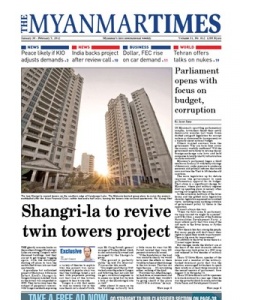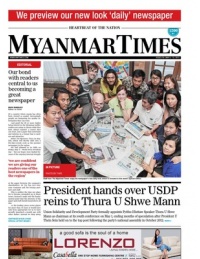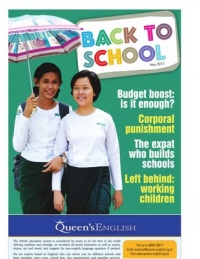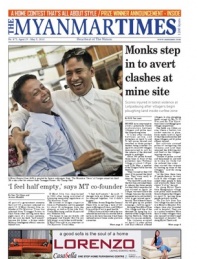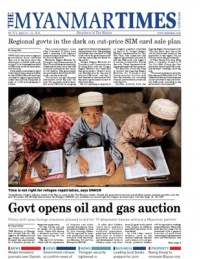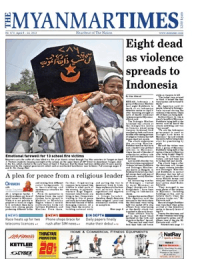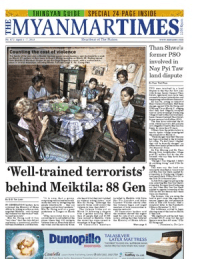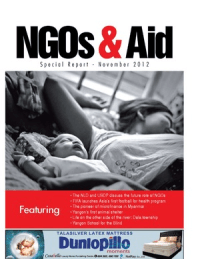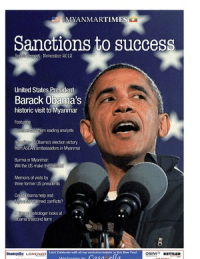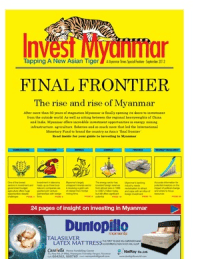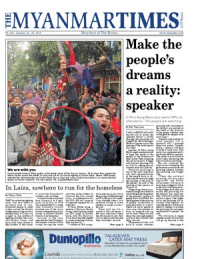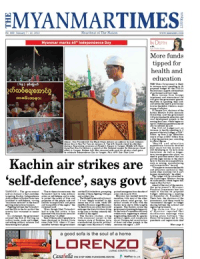myanmar
times
t H e
January 30 - February 5, 2012
Myanmar’s first international weekly Volume 31, No. 612 1200 Kyats
Peace likely if KIOadjusts demands
>
3
NEWS
India backs projectafter review call
>
10
NEWS
Dollar, FEC riseon car demand
>
11
BUSINESS
Tehran offerstalks on nukes
>
19
WORLD
By Jason Szep
IN Myanmar’s sprawling parliamentarycomplex, lawmakers flexed their newlydemocratic muscles last week. Somedrafted anti-graft legislation for corruptnations or clamoured for transparency ona typically secret national budget.Others wanted answers from thegovernment: Why are train lines acrossthe country woefully inefficient? Will thegovernment move faster to revamp clearerforeign-exchange rate laws and holdcompanies to task for shabby infrastructureon state contracts?Myanmar’s parliament began a thirdsession on January 26 with feisty stirringsof democracy, under pressure to accelerateeconomic and political reforms that couldsoon convince the West to lift decades-oldsanctions.The main legislation up for debaterequires the government to seekparliamentary approval for its budget.That alone is a significant change forMyanmar, where past military regimesdrew up spending plans in secrecy, oftencarving out largesse for the army.In the cavernous hallways of the lowerhouse and the gilded main legislativechamber, legislators expressed unvarnishedviews, including some scathing criticismof government policy by those in theopposition.It wasn’t always this way.“When we first came to parliament,we were worried we might be arrested,”said U Ba Shin, a member of the RakhineNationalities Development Party, amajor ethnic party that won nine of the440 seats in the lower house, or PyithuHluttaw.“Now there is less fear among the people.But many people still don’t know theirrights or speak their minds in parliament.There is big room for improvement.”In addition to the lower house there is a224-seat upper house.But changes inside the hluttaw are atthe heart of the most dramatic reformssince the army took power in a 1962 coupand ushered in five decades of militaryrule.Thura U Shwe Mann, speaker of thehouse and a member of the military-backed dominant party that won theelection, encouraged lawmakers to speaktheir minds on at least three occasions inthe second session of parliament, from August 22 to November 25.Thura U Shwe Mann’s call for opennessis in stark contrast to a year ago, when hewas the powerful third-in-command of theState Peace and Development Council.
Parliamentopens withfocus onbudget,corruption
THE ghostly concrete husks onthe southern fringe of KandawgyiLake are among Yangon’s mostdiscussed buildings. And theyare set to get tongues waggingagain, with the developerdusting off plans to turn themothballed towers into servicedapartments. A grandiose but unfinishedproject of Malaysian billionaireRobert Kuok’s Shangri-la Yangon Company Limited, workon the towers was suspended in1998. They have since been thesubject of perpetual rumour,with Yangon residents espousinga variety of theories to explainwhy the project was nevercompleted. A popular story wasthat the buildings failed a soiltest, with proponents pointingout that one of the towersappears to lean to one side. Yangon is a city that seemsto runs on rumour but in thiscase there’s not a shred of truth,says Mr Craig Powell, generalmanager of Traders Hotel, whichis also substantially owned andmanaged by the Shangri-lagroup.“The ground is perfectlystable,” he told
The MyanmarTimes
earlier this month.“You might recall that in 2010we had an earthquake in Yangonand following that not only didwe get a structural engineer into assess our hotel but we tooka look at the [Kandawgyi] siteas well.” After almost 15 years on icethe buildings naturally looka little worse for wear but MrPowell insisted they were 100percent structurally sound.“If the foundation or the landwas unstable clearly we wouldhave seen the effects or therewould have been evident damageto the two towers. That has notbeen the case. … It’s not sinkingeither, nothing of the kind.“Put it this way: After [Shangri-la] had done an assessment andfeasibility study they wouldn’tbe going ahead if the placewasn’t fit to continue,” he says.
Shangri-la to revivetwin towers project
More page 4More page 4The two Shangri-la owned towers on the southern edge of Kandawgyi Lake. The Malaysia-backed group plans to revive the project,mothballed after the Asian Financial Crisis, within two-and-a-half years, turning the towers into serviced apartments.
Pic: Kaung Htet




C
omment
the
M
yanMar
t
iMes
2
January 30 - February 5, 2012
The Mail Box
Got something to say? We want to hear from you. Address allcorrespondence to the Editor,
The Myanmar Times
(English). Weendeavour to respond to all correspondencei n a timely manner.Address: 379-383, Bo Aung Kyaw Street, Kyauktada township,Yangon. Telephone: (+951) 392-928, 253-642Fax: (+951) 392-706Email: your.myanmar.times@gmail.com
Dear editor,World leaders started an interfaith movement as a meansto stop terrorism; to educate people that their faith orreligion requires them to show love and that they shouldwork for the betterment of mankind. But these people donot seem to be aware that economies and administrationsneed to viewed in the same context. All faiths and religions try to educate people thatphilanthropic ideologies and nonattachment towardspersonal greed, lust and anger are positive. To cite anexample: today, there are economic crises all aroundus, and a lot of political turmoil. Every sensible personunderstands that this is the result of greedy investorsand the ruling bodies above them.I do not want to blame anybody specific, however. Iwant world leaders to see things the way our ancientancestors have taught us. That is, to look at things froma perspective that I will call “Asian Values”.So what are Asian Values? To put it in simple terms:“You must be sincere and dutiful, and will be rewardedfor your sincerity. You do not need to fight for rights.”Today, we see that this does not seem to work because noteverybody is sincere. Greed and lust prevails everywhere,giving rise to movements like “Occupy Wall Street”.We have all witnessed that a mistreated waysidehawker in Tunisia caused the turmoil that brought downthe ruling body of that nation. The greedy money gamersare nearing their doom if they do not start mending theirways. Even in America, where material goods are highlyvalued, Andrew Carnegie – the richest person of his era –donated everything he owned on his death. Why can’t therich of today forsake a certain amount of their property orprosperity to the needy through equitable channels?Not only the leaders but also every individual must dotheir duty with simplicity and sincerity if we are to enjoypeace and prosperity. If not, we will be just be inviting anoose around our necks. May love for humanity prevail.U Aung Naing,Interfaith Group
By Aung Tun
ALMOST a decade ago, aSingaporean friend left melost for words when he saidthat Myanmar had closedits economy off through itshuman rights violations,ethnic conflicts, politicaldeadlock, and lack of therule of law, transparencyand progress towardsdemocratisation. How couldI respond? He was right.To a certain extent we hadisolated ourselves, with ouractions encouraging theWest to impose economicsanctions.But today Myanmaris a different place, achanged place. Over thepast 10 months, I havebeen continually surprisedat the significant stepstaken by the President UThein Sein’s government,including attempts to end orreduce conflicts with armedethnic groups; cooperation,if not reconciliation withthe democratic opposition;and two amnesties, onOctober 12 and January 13,that resulted in importantpolitical figures beingreleased. This progress hasled to justifiable calls for thelifting of sanctions.Can we say that Myanmaris in the process of openingup its economy to theoutside world? Certainly.The political conditions arenot perfect – more amnestiesneed to be granted,fundamental rights restored,peace process completedand democratisation movedforward. Many importantreforms are yet to beintroduced. Nevertheless,it is no longer the time todebate whether sanctionsshould be lifted; rather, itis time to discuss how tolift them.Given sanctions workon the carrot and stickprinciple, positive changesmust result in theirremoval. I don’t want tosay that the sanctionspolicy has failed or evenbeen counterproductive;instead I would say it didn’twork out as intended. Forinstance, while businesstycoons targeted bysanctions – along with theirsons, daughters and otherrelatives – have enjoyedaccess to quality educationand healthcare abroad, andeven the chance to shop inSingapore, Malaysia, andThailand, the majority of thepopulation has seen almostevery service provided bythe government deteriorate.They have been largelyunaffected by the sanctions,while we have suffered notonly because of sanctions butalso the mismanagementthat prompted the sanctionsto be put in place. This hasexacerbated inequality inour society. It seems almostas if the carrot has beenapplied to the cronies andthe stick to the poor.Some have expressedfears that when sanctionsare lifted these people andtheir relatives will prosperfurther, while the majorityof us will see few, if any,benefits. Well, even if thatwere the case, how wouldit be different from whatis happening now? It isdifficult to quantify thepsychological effect of sanctions. Without themwe have many more reasonsto be optimistic about ourfuture. Lifting sanctionswould also mean they couldnot be used as a convenientexcuse for mismanagement.The opening up of newexport markets andsources of investment anddevelopment assistanceis likely to benefit many.We also need significantreforms in almost everysector but lack the capacityto do so. These reforms couldbe achieved with technicalassistance from the Westbut this is precluded bysanctions. Additionally,greater transparencycan be expected whenrepresentatives of the National Leaguefor Democracy are inparliament; the party hasalways stated that social justice and equitabledistribution of wealth isone of its priorities. Havingthe NLD in a position of some power should go someway towards ensuringpost-sanctions economicdevelopment is moreequitable than what wehave seen over the past twodecades. While sanctionsremain in place, however,the chances of progressivereforms being introduceddiminish.During a recent visit toMyanmar, US Senator MitchMcConnell, a long-timesupporter of sanctions, laidout three key criteria for theremoval of sanctions: allowinternational observers tomonitor the April 1 by-elections; stop fightingwith the country’s ethnicminorities; end the “murkyrelationship” with NorthKorea.Based on this, sanctionsare likely to disappearquite soon. Meeting MrMcConnell’s demands wouldseem less challenging thanearlier calls for the releaseof all prisoners of conscience.If all sanctions are lifted, Icertainly won’t be sad to seethem disappear. I believemany others in Myanmarare also eager for the Westto play a more positive rolein shaping the country’sfuture.(
Aung Tun has formerlyworked at
The MyanmarTimes
and non-governmentorganisation Proximity Designs and is currently aresearch fellow at Myanmar Egress, a Yangon-basedtraining centre and policythinktank.
)
Time for talk on sanctions is over
IT is odd how foreignobservers often have adifferent perception of acountry’s political leaderthan citizens of thatcountry do.Take the case of Malaysia’s former PrimeMinister MahathirMohamad, who wasroundly despised in theWest, especially in theUnited States.But at home, Mahathirwas viewed, rightly, asa visionary leader whoturned his formerly docileand disparate nation intoan economic powerhouse.In a reverse way, formerPhilippine PresidentGloria Macapagal-Arroyowas feted in Washingtonand other Westerncapitals, while steadilyinspiring revulsion amongher compatriots.Which brings us to thecurious case of Thailand’sopposition leader, Abhisit Vejjajiva, who lost lastJuly’s general electionand ceded the primeminister post to YingluckShinawatra, a politicalnovice.His loss baffled mostforeigners, who had alwaysregarded Abhisit as asplendid national leaderand a future Mahathir-likeregional giant. Yet he proved a weakand vacillating primeminister after hisunexpected, and arguablyillegitimate, accession tothe post in December 2008.It is a bit curious,since Abhisit, 47, is apleasant enough chap,who is undeniably clever,photogenic and articulate.But he is simply a lousypolitician and a pawn of the elite. As well, he isa man who appears tohis fellow Thais as moreBritish than the British –again, curious, since he isethnic Chinese.But he was born inEngland, educated at Etonand Oxford, carries Britishcitizenship and has aBritish name, Mark.Simplistic though itmay sound, that is whyWesterners like him somuch. He is one of them.His fellow Thais,however, do not share thatsentiment, and he appearscongenitally unable tostrike a rapport with them,especially with the vastmajority of common ruralfolks.Consequently, there isnow widespread gripingover his performancewithin the ranks of Abhisit’s own DemocratParty.Even the
Bangkok Post
,a staunchly pro-Abhisitorgan, recently reportedthat “party membershave refused to keep theirdispleasure with the partyleadership bottled up”. As if chastising awayward teenager, thereports slam Abhisit for“mixing with the wrongcrowd” – namely youngsycophants whose politicalacumen is, to put it mildly,badly skewed. As a result, there arenow aspiring challengerswho are already effectivelycampaigning to replace Abhisit.The number one Brutusis Abhisit’s buddy andformer finance minister,Korn Chatikavanij.Like Abhisit, Korn isalso a member of theBangkok bourgeoisie andalso attended privateschool in England andthen went to Oxford.Korn’s co-quisling,playing the part of Cassius, is the royalistgovernor of Bangkok,Sukhumphand Paribatra,whose elitist connectionsare even tighter than thoseof Abhisit and Korn.Sukhumphand, whosees himself as a kindof Boss Geddes of thesprawling capital, loathes Abhisit and has noqualms about using thegovernorship to undercuthis titular boss.Bangkok is the party’sheart and soul, and if theDemocrats cannot build onthe seats they have there,they are dead. The dreamySukhumphand thinks he,not Abhisit, is the man todo that. Yet while the Democratsappear to be caughtbetween a rock and ahard place, there may bea way out, if Abhisit canshelve his callow, effetedemeanour and get downand dirty.It is not impossible, ashe has shown when hespeaks about his nemesis,former Prime MinisterThaksin Shinawatra, theelder brother of currentPM Yingluck. Abhisit once told me,with his lips curlingvituperatively: “Thaksinis nothing. There isnothing there. TheDemocrats will neverform a coalition with hisparty while I am leader.”Now, if only he could puton a steel glove and talkmore like that, and learnto eat fish balls with theplain folks in the paddyfields, he’d have a chanceof keeping his job.But until that happens,the Democrats must resignthemselves to a longsojourn in the politicalwilderness.
Perceptions of world leaders often differ
Thai Prime Minister Abhisit Vejjajiva speaks during a rally for the upcoming elections inBangkok on June 17, 2011. Thailand's powerful army chief jumped into a heated electionbattle with a thinly veiled attack on the resurgent opposition led by a sister of fugitive ex-prime minister Thaksin Shinawatra.
Pic: AFP
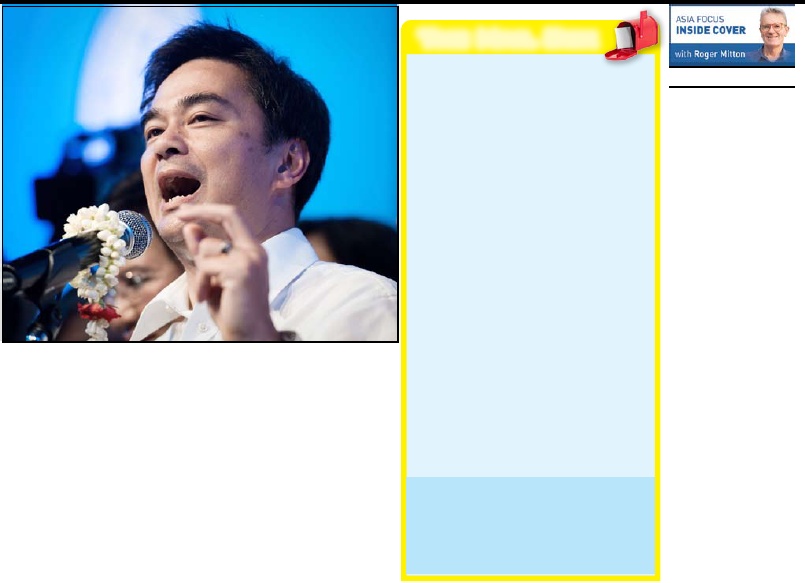




n
ews
3
the
M
yanMar
t
iMes
January 30 - February 5, 2012
Sedona Hotel12 x 4
By Shwe Yinn Mar Oo
LEADERS of the 88 Generationstudent movement say they wantto work “hand-in-hand” withreformers across the politicalspectrum and also support the roleof Daw Aung Suu Kyi.Min Ko Naing, a prominentstudent leader who was releasedfrom prison on January 13 underan amnesty, said at a pressconference in Yangon on January21 that the group was mostlyoptimistic about the country’spolitical future.“I want to clearly inform thatwe (88 generation students) wouldpull the rope (stand) on the side of reformers,” said Min Ko Naing.“I am not as pessimistic to saythat it the glass is half empty,while I don’t want to be overoptimistic and say it is half full. Weare more like fish that need waterfor our survival,” the veteranactivist said.“We will clearly support thosewho want to build justice, freedomand equality in the battle againstthose who want to destroy thesethree things,” he said.Other prominent 88 Generationleaders freed on January 13,including Ko Ko Gyi, Jimmy,Htay Kywe and Mya Aye,also participated in the pressconference.The 88 Generation group releaseda statement the same day in whichit expressed support for Daw AungSan Suu Kyi’s decision to contestthe April 1 by-elections.The students also urged theUnion Government to work asfast as it could for the return of those who had been forced to leavethe country for political reasonsand the release of prisoners of conscience who remain behindbars. The group said these twosteps were important for improvinghuman resources in the struggle tobuild a new nation.Unlike US Senator MitchMcConnell, who stated duringhis recent visit that President UThein Sein was a reformer, the88 Generation said it was stillwatching the president’s actionsclosely.“We will keep our eyes on him[and watch] whether the presidentdoes reforms genuinely,” said MinKo Naing.“But I hope for [theimplementation of promises madein] his very first speech, in whichhe said he would work hand inhand with people who do not havethe same view.”
88 Generation leader Min Ko Naing speaks at a press conference in Yangon on January 21.
Pic: Yadanar
88 Gen backs reformers, Daw Suu Kyi
CHIN political parties areassisting the Chin NationalFront to open liaison officesin their state, a party leadersaid last week.The government andCNF reached a preliminarypeace agreement in the Chincapital Haka on January 6. A government negotiatingteam led by Minister forRail Transportation U AungMin and Chin State Chief Minister Hung Ngai signedthe pact with CNF leader DrSui Khar.The “pre-agreement”contained items coveringfreedom of movement forunarmed CNF membersthroughout the state andthe opening of three liaisonoffices. The will also be ableto participate in developmentactivities in Chin State underthe agreement.U Zo Zam, chairman of theChin National Party, said hisorganisation would assist theCNF to open liaison offices inTiddim and Thantlang.“Chin Progressive Party isalso working with the CNFto open a liaison office inMatupi,” he said..U Zo Zam, who also tookpart in the peace talks as anindependent third party, saidhe supported the terms of theJanuary 6 agreement.“Peace is better thanfighting. Having a friendlyconversation is better thanquarrelling so we can say thispre-agreement is the firststep to start having a friendlyconversation with each otherafter 23 years of quarrelling,”U Zo Zam said.“This is the first meeting of the government and CNF, itwas brokered by prominentcivil society leaders. A secondis also planned but we don’tknow exactly when; it dependson the political situation.“I believe there will be peaceas soon as the governmentcan guaranteed equal rightsas that is what the [CNF] hasbeen fighting for.”
– Nuam Bawi
Parties to assist CNFwith liaison offices
By Soe Than Lynn
A PEACE agreement in northernMyanmar is within reach if the Kachin IndependenceOrganisation changes some of thelanguage it uses in negotiations,a senior Kachin political figuresaid last week. Amyotha Hluttaw representativeU Khet Htein Nan, a member of the union level negotiating teamthat recently met KIO leaders inRuili for two days of talks, said anagreement would be possible if theKachin group rephrases some of itsdemands.U Khet Htein Nan said someof the contentious points on theKIO’s agenda were included inthe constitution, such as equalrights for all ethnic groups, but indifferent language from that usedby the KIO.“It will be hard to reach anagreement if we follow theirwording exactly. For example …words like ‘self-determination’,”he told
The Myanmar Times
lastweek. “Phrases like ‘equal rights’are already included to some extentin the constitution so if the wordsincluded in the constitution arecomplemented by slight changes,I am hopeful that both sides canreach an agreement.”Both sides agreed on four pointsduring the most recent meetingand the seven items still undernegotiation will be made publicfollowing the next round of talks,he said.U Yup Zau Khawng and otherethnic Kachin leaders have againbeen asked to coordinate betweenthe KIO and the government teamand he said further talks wereexpected before Union Day, onFebruary 12.U Yup Zau Khawng, one of fourKachin elders who have taken onthe intermediary role, said he wasunsure whether the KIO wouldagree to change the wording of their demands.“It is hard to say [what willhappen] in politics. But now boththe government and KIO arebeing more open and transparent.They are obligated to negotiate asettlement for the future benefitof the public,” he said.“Both sides have a spirit of goodwill … [and] believe that long-term stability cannot be achievedthrough arms and bullets. Asthey are [committed to] resolvingthe conflict by means of politics,there is good potential for it to beresolved,” he said, adding that thedate and venue for the next roundof talks was still being negotiated.“It was held in Ruili [last time]to avoid something going wrong.The armed forces of both sides arecomposed of soldiers of variousmindsets.”While some have portrayed thelast round of talks as a failure fornot securing a ceasefire agreement,U Khet Htein Nan said fightinghad reduced as a result of theJanuary 18-19 meeting.He said there were fewer newrefugees and locals had startedusing the Bhamo-Laiza andMyitkyina-Bhamo roads again.However 20,000 displaced peopleremain in 62 camps in government-controlled areas, while another40,000 are believed to be displacedin KIO-controlled areas.–
Translated by Thit Lwin
Peace possibleif KIO adjustsdemands, saysgovt negotiator
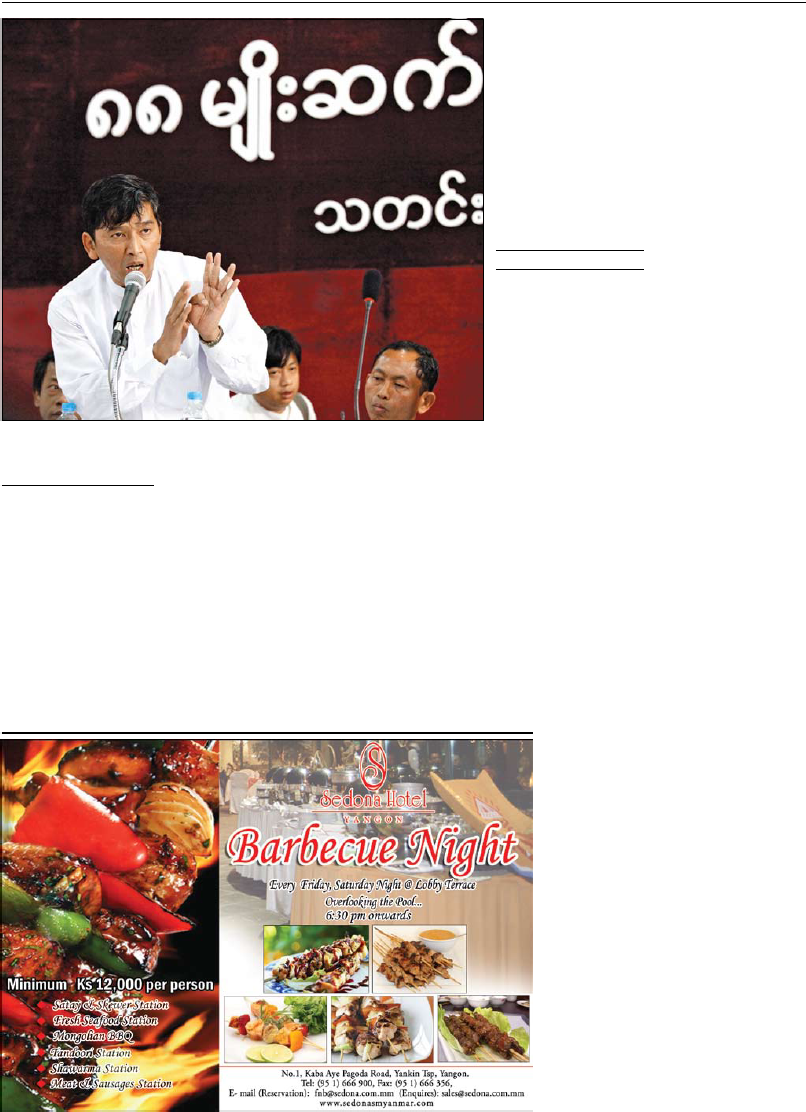

検索履歴:
結果00中00
00結果次の結果
p.
Notes
Post Note
